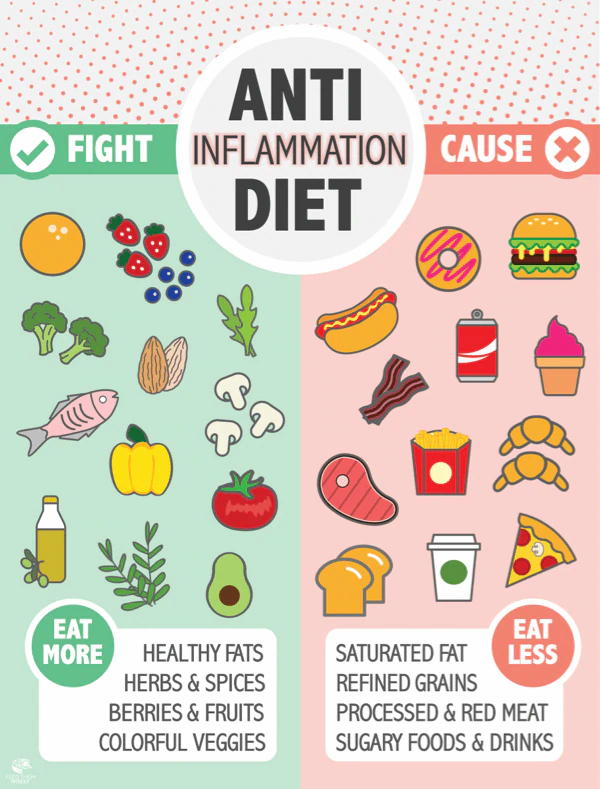Disclosure: Articles may contain affiliate links. As an Amazon Associate, we earn from qualifying purchases (at no additional cost to you). See our full disclosure here.
Last updated on October 4th, 2022 at 06:40 pm
The following content is for informational purposes only. This article is not intended to be a substitute for professional medical advice, diagnosis, or treatment. If you are having a medical emergency, call your doctor or 911 immediately.
Have you been thinking about trying an anti-inflammatory diet? To see if it might be right for you, there are a few things to know first. Let’s dive in!

The Problem of Inflammation
Inflammation typically has a negative connotation. Even though our bodies use inflammation to fight off sickness or repair a wound, it’s still an indication that something is wrong. And when inflammation occurs when it shouldn’t and refuses to go away, inflammation itself is a problem.
How problematic is the wrong kind of inflammation? Here’s a rundown:
- It’s harmful to your gut
- It’s harmful to your joints
- It’s harmful to your heart
- It’s harmful to your sleep
- It’s harmful to your gums
- It’s harmful to your lungs
- It’s harmful to your bones
- It’s harmful to your skin
- It’s harmful to your weight
- It’s harmful to your mental health
- It can cause cancer
Now the burning question is, what do we do about unhealthy, chronic inflammation? Diet plays a huge role in inflammation issues (activity level and stress also contribute, but significantly less so). Plenty of studies have found that foods that are highly processed, fried, or full of saturated and trans fats cause the problem. A diet rich in fruits, veggies, whole grains, and healthy fats can actually reduce the problem.
The Basics of the Anti-Inflammatory Diet
Enter the Anti-Inflammatory Diet. The goal? To reduce chronic inflammation. The method? Eating a diet made up of healthy proteins, healthy fats, and healthy carbohydrates. You can also incorporate ginger into your diet and supplement with turmeric (with a doctor’s approval).
Healthy Proteins:
Avoid red, fatty meat and dairy products. Instead opt for beans, lentils, walnuts, pistachios, pine nuts, almonds, and cold water fish.
Healthy Fats:
Avoid fried foods, soybean/vegetable oils, and sugary processed foods. Instead opt for coconut and avocado and their oils, and the various nuts and fish listed above.
Healthy Carbohydrates:
Avoid white breads and pastas, and instead opt for nutrient dense fruits and veggies.
The Basics and Benefits of the Anti-Inflammatory Diet | #health #healthyeating #wellness #antiinflammatorydiet Click To TweetThe Benefits of the Anti-Inflammatory Diet
The list of potential problems above makes it pretty clear how beneficial the anti-inflammatory diet could be. While there haven’t been extensive studies done to prove whether or not this diet will fix many of these issues, there’s plenty of science and experience that contributes to the possibility. Let’s break it down just a little bit. By implementing the anti-inflammatory diet, you could:
- Feel less bloated
- Have less achy joints
- Protect your arteries
- Enjoy deeper sleep
- Spend less time at the dentist
- Have more stamina
- Strengthen brittle bones
- Clear up your skin
- Lose some weight
- Improve your mood
- Fight cancer before it starts
The anti-inflammatory diet can’t promise you perfect health, but it can get you well on your way to significantly improved health. If you think you may have chronic inflammation issues, talk to your doctor about implementing this diet. We have one body and one life. Let’s do our best to take care of it!
Jump into the anti-inflammatory lifestyle by throwing together our super simple and delicious recipe for Lemon Turmeric Popsicles. Then check out a few of these links and the list of low inflammation foods and high inflammation foods on the graphic below:
Dr. Weil’s Food Pyramid
Low-grade Inflammation, Diet Composition and Health
The Anti-inflammatory Diet in Rheumatoid Arthritis
Evidence Supporting the Anti-Inflammatory Diet

You can also find MomsWhoSave on Pinterest, Facebook, Instagram, and Twitter. Join us for updates.
Don’t miss a thing! Subscribe to MomsWhoSave’s blog posts below!
Leave a Reply